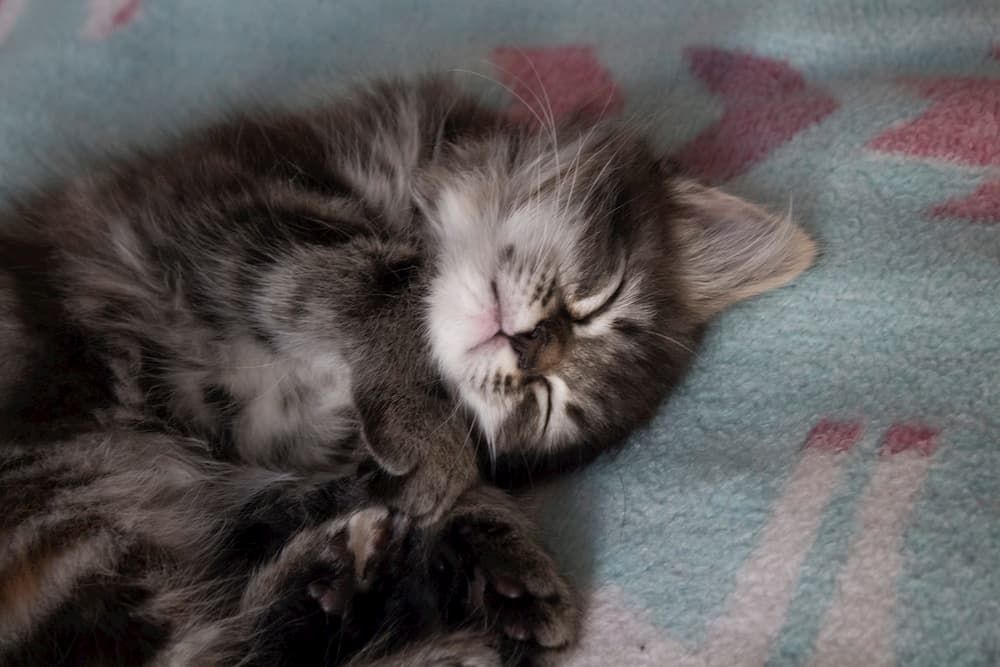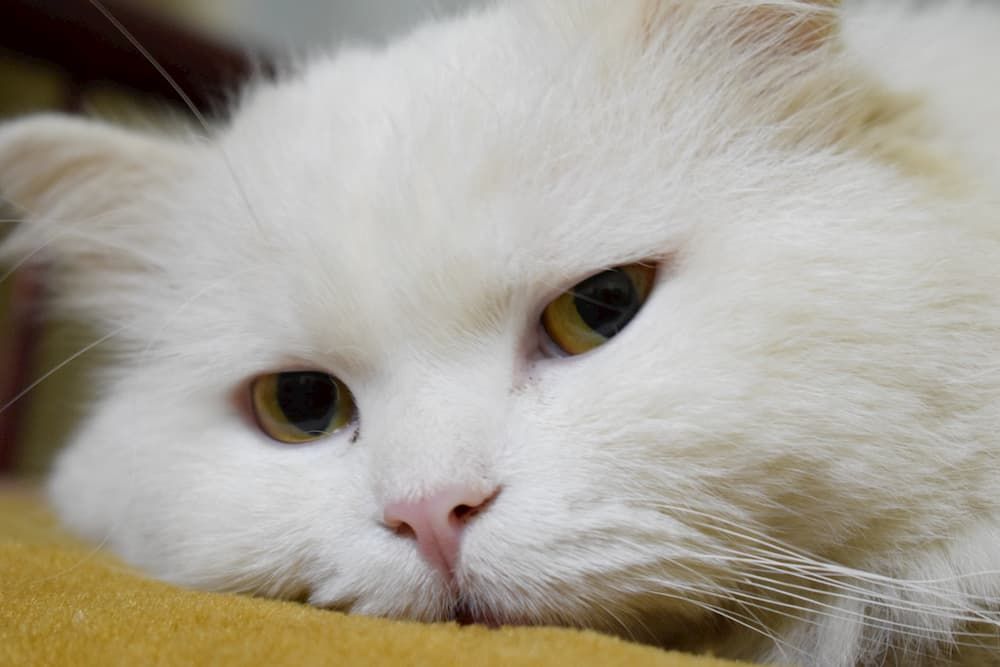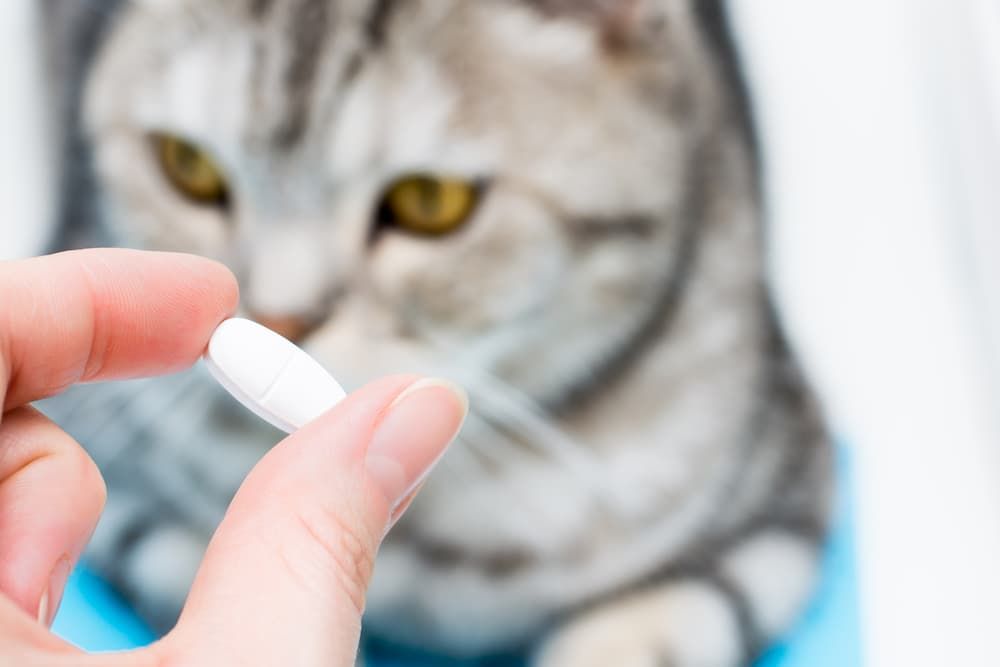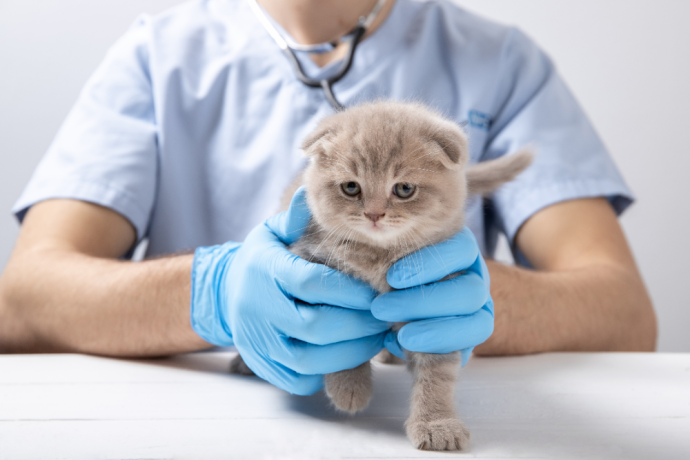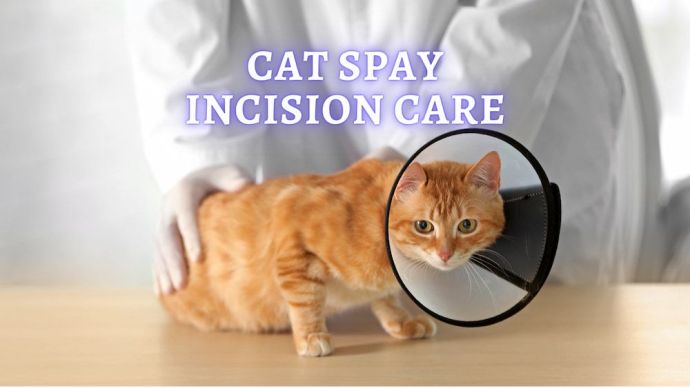Cat Allergies: Symptoms, Causes, Testing, Treatment, and Prevention (Vet Advice)
Written by:
Author: Dr. Sara Ochoa
Dr. Sara Redding Ochoa is a veterinarian with many years of experience and higher education. During her time in veterinary school she was able to learn form some of the most well-known veterinarians from all over the world. Sara lives happily with her husband Greg and her babies Ruby the schnoodle, and Bam-Bam her bunny. Dr. Sara Redding Ochoa has a passion and love for animals that makes her a wonderful asset to our team.
View all 13 articlesLearn about our editorial process and veterinary review board.
Viewed: 311
Updated on: 06/15/2021
Is your cat itching and scratching? This may be a sign of allergies. Allergies are often seen starting in the spring and can even last into the fall months. Some cats can even have it year-round.
Allergies can be very frustrating for you and your pet, but there are some environmental changes that you can do to help your cat.
How do I know if my Cat has Allergies?
There are many common signs that you may see that would indicate that your cat has allergies. These are some of the most common:
- sneezing;
- coughing especially if your pet has asthma;
- wheezing;
- itchy skin and scratching;
- itchy, runny eyes;
- itching on the back or base of the tail (this is most commonly seen with flea allergies);
- itchy ears and ear infections;
- vomiting and diarrhea, which is often seen in felines who have food allergies;
- snoring (because of the inflammation in the throat)
- chewing on their paws or swollen paws.
If you notice any of these signs, it would be best to take your pet to the vet. They can help you decide if these signs that you are seeing are due to this disorder or some other underlying issue.
READ MORE: Best Cat Food for Allergies
What are the most common Allergies in Cats?
Many things can trigger disorder and these are some common things that can cause your pet to have allergies:
1. Fleas
If your pet has fleas, they can be very disorder to these bugs. Most cats don’t tolerate it to the saliva of the fleas and not the fleas themselves. When a flea bites your pet, they will inject some saliva into your cat’s skin, causing them to itch and scratch. Most of the time you will see scabs and hair loss near the base of the tail or under your pet’s chin.
Some cats are even allergic to topical flea and tick medications. If you apply flea and tick medication to your pet and start to itch even more or lose hair in the area you applied these products, it would be best to use a pill to help control the fleas. If your cat is allergic to topical flea and tick medication, it is best to wash it off the skin as soon as you notice the reaction to it. This will help limit the spread of the reaction to other parts of your animal’s body.
2. Environmental Allergies
This includes anything that may be in their environments, such as pollen from trees, plants, or weeds. This can even be dust, mildew, and mold. Most of the time, you will notice that your cat is only showing signs of disorder during certain months.
If your pet is tested for allergies, you may be able to pinpoint what types of plants are causing your kitty to have allergies. You can then remove these plants from your yard and help decrease your pet’s disorder reactions.
3. Food Allergies
While this is rare, some cats can be allergic to certain types of food. [3] Most pet foods contain chicken or fish. If your cat does have a food disorder, you may notice diarrhea, itchy ears, and redness around their rectum. Usually, switching to a different protein food will help these symptoms. It needs to help your pet achieve a balanced diet and choose appropriate foods.
4.Atopic Dermatitis
Atopic Dermatitis [2] is the medical term for skin allergies. This is how many cats react when they come in contact with something. You will commonly see cats that are itching, have sores, hair loss, reddened skin, or scabbing. Many times these cats will need antibiotics to fully clear this infection.
Other things that your cat may be allergic to are:
- Prescription drugs: Certain medications, especially thyroid medication, can cause your animal to itch;
- Perfumes;
- Cleaning products or laundry soap;
- Cigarette smoke;
- Fabrics;
- Rubber and plastic material.
Trying to pinpoint the exact things causing these reactions in your cat can be very difficult. Start with only changing one thing at a time until you figure out what is causing these issues.
Medical Reasons that My Cat Maybe Itching
Some medical conditions can cause your pet to be very itchy. If you are having a tough time figuring out the cause of your pet’s disorder, talk to your vet. Your vet can examine your cat, run bloodwork, and figure out if there are many medical issues that would cause your pet to have disease signs.
Your cat can have eye infections, skin infection, or autoimmune disease, which shows the same signs as an animal with allergies. Many times, before starting expensive testing, it is a great idea to rule out any underlying medical issues. These can usually be easier and cheaper to treat.
How to Test My Cat for Allergies?
If your cat has allergies, there are many different ways that you can test your pet. This may be a trial process that your cat would go through, and there is even testing that your vet can do for your cat.
1. Skin Testing
Just like with people, your vet can do skin testing on your cat. They would inject small amounts of different substances into your cat’s skin to see how they react to it. This will help determine how disease your cat is to different things that your pet could contact. This is often done by a veterinary dermatologist at a specialty hospital.
2. Allergy Blood Test
There is a blood test that can be run for environmental and food diseases. These tests may not be 100% accurate and can sometimes be very costly. This would be a very easy way to test your cat for different diseases. These tests are not invasive and with just simple blood draw your vet can tell you what your pet is allergic to. Depending on the results of these tests, you can then adjust your cat’s environment and food.
After finding out what your cat is allergic to, many allergy testing companies can make a vaccine for your cat. This would be an injection that your pet would receive that would slowly desensitize them to the main things.
3. Food Trial
If you think that your pet is allergic to its food, the best thing to do would be a food trial. This is when you would switch to a different protein than what your cat is eating now or switch to a hydrolyzed protein diet. There are food allergies diets made specifically for cats with allergies. These food trials should be done for 6 to 8 weeks before deciding that the food is not helping. When switching foods, do so slowly so that you do not upset your cat’s stomach causing them to vomit or have diarrhea. [1]
What human foods are Cats Allergic to?
Common people foods that your pet may be allergic to are:
- beef
- fish
- chicken
- dairy products
Many cats are allergic to milk and should not drink milk. If your cat shows signs of food allergies, a common protein that most vets recommend is rabbit protein.
READ MORE: How to Treat Cat Ear Infection
What Can I give my Cat for Allergies?
If your animal has allergies, there are many things that you can do to help them feel much better. It is always best to try to prevent these from showing clinical signs in your cat but eventually, your cat will start having some problems with their allergies. It is best that your kitty sees your vet as soon as you start to notice any issues.
These are some things that your vet may prescribe to your cat for their allergies:
Steroid Pills
If your pet has severe signs of skin issues, your vet may prescribe oral steroid medications for your cat to take. This will help decrease the inflammation and stop them from itching. This will allow their skin to heal
Antibiotics
Many times pet’s with allergies will have a secondary bacterial skin infection. If your animal has a skin infection, it is best for them to also take antibiotics to clear this infection.
Eye and ear drops
Allergies can cause your pet to have discharge from their ears and eyes. If your cat’s allergies are also causing issues with their ears and eye, your vet may prescribe drops for you to use every day.
Antihistamines
Antihistamines such as Benadryl will help with mild allergies. These must be given to your pet every day to help. Many people will
Flea Prevention
If your pet is allergic to fleas, your vet may recommend that you put flea and tick prevention on your pet every month. This will help prevent them from getting any fleas on them causing the allergic response.
Preventing Allergies in Cats
Preventing is usually the best way to help your pet with allergies. Knowing what they are allergic to and developing a prevention plan will help your cat stay happy and healthy.
Flea Prevention
If your animal is allergic to fleas, keeping your kitty on flea prevention, year-round is best. Even in the cold winter months, you can still see fleas on your pet. It only takes one flea to cause your kitty to have a lot of skin issues.
Dust-Free Litter
Some animals are allergic to dust and pollen. Ensure that the cat litter you are using is dust-free or very little dust. This will help keep your cat’s nose free of all dust and irritations.
Hydrolyzed Protein diet
If your pet has food allergies, a hydrolyzed protein diet is the best. These diets contain proteins that have already been broken down into smaller molecules. This makes it easier for your cat to digest.
Keep Your Cat Inside
If your animal is allergic to things that are blooming outside, keep them inside as much as possible, especially during the high pollen times of the year. If your animals does like to spend time outside in the spring, when they come back inside, use a damp cloth to wipe down their fur. This will help remove any pollen and decrease the allergy issues in your cat.
Give Your Cat a Bath
While this may not be tolerated by all pets. If your pet likes baths bathing them will help remove any allergens that are on their fur. Even wiping them down with a damp towel will help.
Use a Different Laundry Detergent
If your cat is allergic to soaps, you can try using a different laundry detergent when washing their beds and blankets. One of the best laundry detergents for you to use on your pet are those meant for babies. These detergents are very gentle and safe to use on gentle skin.
Frequently Dust Your House
This may be one task that you hate to do, but dusting a little more frequently can remove dust mites from your house. Dust is a very common thing for your pet to be allergic to.
Use an air purifier
This will help remove any pollen, dust, or allergens from the air in your house. This is even a great thing to have if you suffer from allergies.
Frequently Asked Questions
Can I Give My Cat Benadryl for Allergies?
Yes, your pet can have Benadryl for their allergies. A typical adult cat is around 12 pounds. These animalss would need ½ of a 25mg adult Benadryl tablet. There are also other allergy medications that your veterinarian can give you. Common medications used for allergies in animals are steroids or even Apoquel. Apoquel is a very common dog allergy medication that can be used in cats. If your pet’s allergies do not clear up with Benadryl, talk with your vet about other options.
What can I give my cat for allergies?
If your kittty has allergies, there are many things that you can do. Benadryl or other antihistamines may help. Your vet can even prescribe allergy medication. Low-dose steroids may be used or some vets may prescribe Apoquel for your pet to use. Apoquel is an allergy medication used in dogs that have shown good success in amimals with allergies.
If your pet is allergic to fleas, using a flea control product such as Revolution will help control the fleas. Some kitties are extremely allergic to fleas that it just takes one flea to cause them a lot of issues.
How can you tell if your cat has allergies?
Cats with allergies are usually very easy to recognize. If your pet has environmental allergies, you may see them sneezing and having discharge from their eyes and nose. If they are allergic to fleas, you may notice them itching and pulling their hair out from the back near their tail.
Can a cat have seasonal allergies?
Seasonal allergies are very common in cats. If your pet only has allergy issues in the spring and summer and no issues in the winter, then they have seasonal allergies. You will notice that your cat’s allergies are worse when pollen is falling in the spring.
Final Thoughts
Allergies in pets can be very frustrating for you to treat and your animal to have to deal with. By practicing some simple preventative measures, you can help control allergies in your pet. If these allergies start to cause significant problems or cannot get them under control, it would be best to see your vet. They can prescribe your pet allergy medications and antibiotics if their skin has an infection.
Article Sources:
- Hill, Peter. “Diagnosing Cutaneous Food Allergies in Dogs and Cats ‐ Some Practical Considerations.” British Veterinary Association, bvajournals.onlinelibrary.wiley.com/doi/abs/10.1136/inpract.21.6.287.
- Bajwa, Jangi. “Atopic Dermatitis in Cats.” PubMed Central (PMC), 1 Mar. 2018, ncbi.nlm.nih.gov/pmc/articles/PMC5819051/.
- Verlinden, A., et al. Food Allergy in Dogs and Cats: A Review. tandfonline.com/doi/abs/10.1080/10408390591001117.
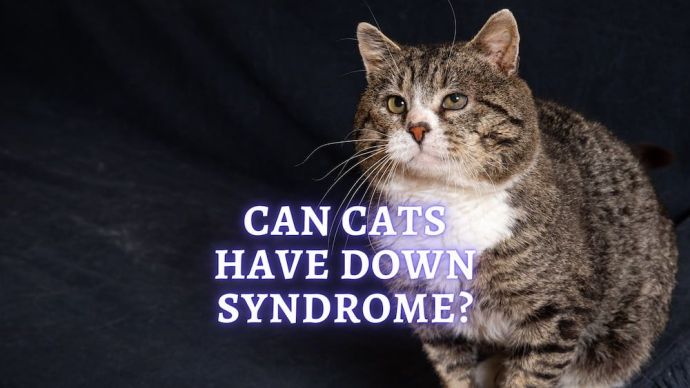 Cat Veterinary Tips Down Syndrome Cat: Can Cats Have Down Syndrome? (Vet Advice)
Cat Veterinary Tips Down Syndrome Cat: Can Cats Have Down Syndrome? (Vet Advice) - 850
- 0
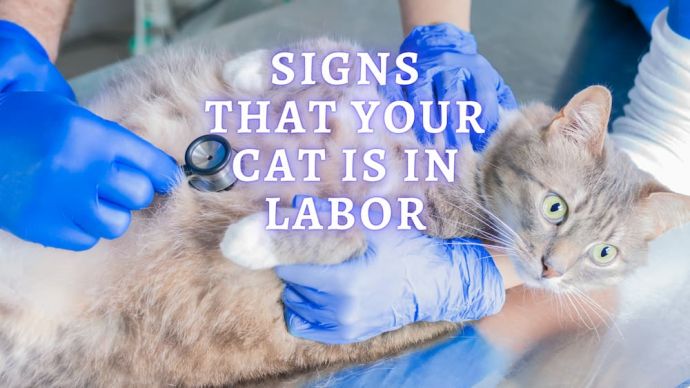 Cat Veterinary Tips Signs That Your Cat is in Labor: How to tell if a Cat is Pregnant?
Cat Veterinary Tips Signs That Your Cat is in Labor: How to tell if a Cat is Pregnant? - 14225
- 1
 Cat Veterinary Tips My Cat Lost its Voice: Can Cats get Laryngitis? (Vet Advice)
Cat Veterinary Tips My Cat Lost its Voice: Can Cats get Laryngitis? (Vet Advice) - 23247
- 13
 Cat Care Why Does My Cat Attack My Legs? 10 Reasons Why and What To Do About It (Vet-Approved Advice)
Cat Care Why Does My Cat Attack My Legs? 10 Reasons Why and What To Do About It (Vet-Approved Advice) - 45567
- 21
 Cat Veterinary Tips Cat Stomach Gurgling: Vet Advice on Why is Your Cat Stomach Gurgling?
Cat Veterinary Tips Cat Stomach Gurgling: Vet Advice on Why is Your Cat Stomach Gurgling? - 35340
- 4
 Cat Veterinary Tips My Cat Lost its Voice: Can Cats get Laryngitis? (Vet Advice)
Cat Veterinary Tips My Cat Lost its Voice: Can Cats get Laryngitis? (Vet Advice) - 23247
- 13












